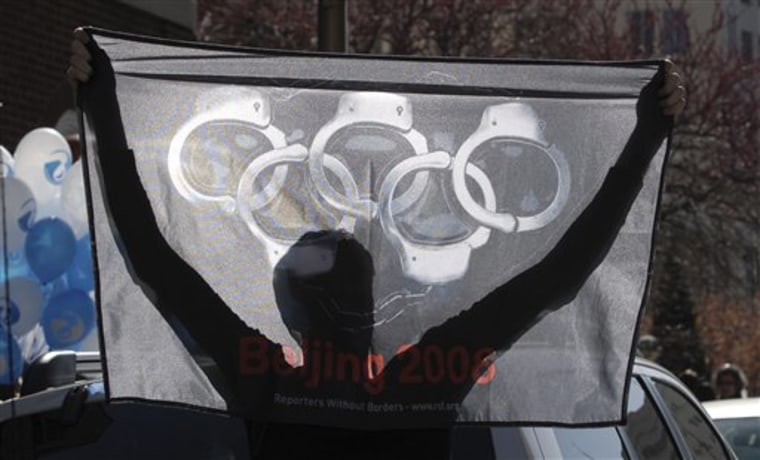Coca-Cola gave investors Wednesday good news on the profit front, then stood by its support of the Summer Olympics in Beijing as vocal shareholders inside and protesters outside the company's annual meeting questioned the beverage maker's business practices.
The company believes the torch relay as part of the run-up to the Olympics should continue, Chief Executive Neville Isdell said.
Atlanta-based Coca-Cola is a corporate sponsor of the torch relay.
The relay has been disrupted in Greece, Istanbul, London, Paris and San Francisco by protesters opposed to China's policies in Tibet and overall human rights record. There has been no trouble at recent stops in Argentina, Tanzania, Oman and Pakistan.
At Coca-Cola's annual meeting in Wilmington, Del., a shareholder asked Isdell how Coca-Cola planned to address the concerns raised.
"I don't believe that stopping the torch run is in any way over the long-run going to be the right thing to do," Isdell said.
Pressed to agree to use the company's influence to put pressure on the Chinese government and Olympic officials, Isdell said flatly, "We are not a political organization."
China was cited in Coke's earnings report as a growing market for the company.
The IOC has said it will review plans for the remainder of the Beijing Olympic torch relay and consider scrapping the international portion of the event for future games.
International Olympic Committee officials have expressed concern about the disruption caused by anti-Chinese protests during the relay.
The IOC has said there are no plans for canceling the rest of the relay, which has been a magnet for protests since the flame embarked March 24 on its 85,000-mile journey from Ancient Olympia in Greece as part of its 21-stop, six-continent tour.
The torch relay is expected to end in mainland China on May 4. The Beijing Olympics start Aug. 8.
Earlier Wednesday, Coca-Cola reported that its first-quarter profit rose 19 percent due to acquisitions and overseas growth, offsetting unimpressive results in its home North America unit that were affected by fewer people going out to eat because of fuel prices and the slowing U.S. economy.
The results beat Wall Street expectations.
The world's biggest beverage company said its profit was $1.50 billion, or 64 cents a share, in the three-month period ending March 28. That compared to a profit of $1.26 billion, or 54 cents a share, a year earlier.
Excluding one-time items, Coca-Cola said it earned $1.58 billion, or 67 cents a share, in the quarter.
Analysts polled by Thomson Financial were expecting earnings of 63 cents a share in the quarter. Analysts generally exclude one-time items from their estimates.
Revenue rose to $7.38 billion from $6.10 billion a year earlier.
Worldwide unit case volume was up 6 percent for the first quarter, helped by acquisitions, and international unit case volume was up 7 percent.
The company saw strong unit case volume growth in China, India, Brazil, Turkey, Russia, Eastern Europe and the Philippines. Volume was flat in its key North America unit.
Coca-Cola has had problems executing its strategy in its home market in the past, and for several years it has seen weaker results in North America as compared to several other countries.
Executives suggested the main impact on the unit in the first quarter was the slowing U.S. economy. They noted that the foodservice segment was hard hit.
At Coke's annual meeting, Isdell was interrupted several times by shareholders who questioned the company's business practices in India and Colombia. The company has been accused of depleting water resources in India and not protecting workers in Colombia. Coke has denied the allegations.
Isdell said Coca-Cola has supported independent inquiries on the issues and those inquiries have shown no evidence to support the allegations.
Outside the hotel where Coke's annual meeting was being held, protesters represented groups called Corporate Accountability International, Reporters Without Borders and the Zionists Organization of America.
CAI is challenging Coke's marketing of Dasani bottled water, saying it's no better than tap water and is less regulated than tap water but sold at thousands of times the price.
Reporters Without Borders is asking Coke to sign a "declaration of responsibility" as a sponsor of the 2008 Beijing Olympic Games.
"China is a big market to them," said Clothilde Lecoz, 25, from Paris. "We want them to be aware that there are some problems."
CAI offered taste tests to passers-by, pitting Dasani against tap water. A group of students from the University of Delaware helped conduct the taste tests, wearing waitress uniforms and holding platters with plastic cups of water.
At the meeting, shareholders approved the election of 14 directors, Ernst & Young LLP's appointment as Coca-Cola's independent auditors and a stock option plan.
They rejected three shareholder proposals, including one that sought to allow shareholders an advisory vote on the compensation of several senior executives. Isdell received total compensation valued at $21.6 million in 2007, a more than 3 percent increase from the year before. President and Chief Operating Officer Muhtar Kent has been named to succeed Isdell as CEO on July 1. Isdell will remain as chairman until Coke's annual meeting in April 2009.
